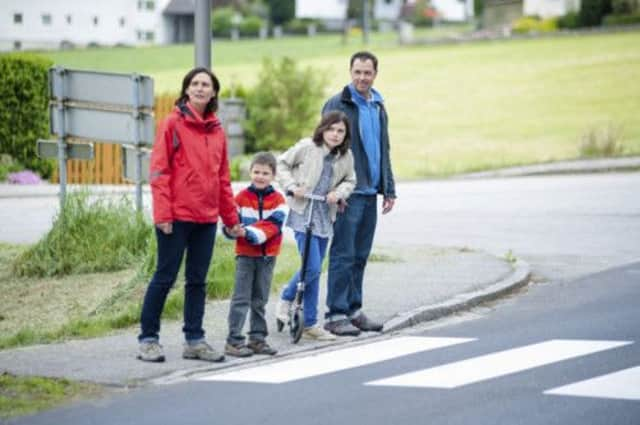Stay safe on the roads


Now school has started, parents need to be sure both they and their children have learned one of the most important lessons of them all – road safety.
Figures from the road safety charity Brake reveal that five children under 16 are killed or seriously injured when walking or cycling every day in the UK, many of them while going to or from school.
Advertisement
Hide AdAdvertisement
Hide AdIn a bid to reduce this number, the UK’s first Local Road Safety Index has been launched to help parents, teachers, local authorities and drivers better understand the risks associated with roads near schools.
“Traffic is the biggest threat that parents have to deal with to keep their kids safe,” says Ellen Booth, Brake’s senior campaigns officer, pointing out that road accidents are the largest non-medical killer of primary-age children.
Booth thinks the index, which has been produced by AXA Car Insurance and road safety research provider Road Safety Analysis, will be particularly useful for schools and local authorities trying to minimise risks on roads near schools.
“It’s full of data and the people responsible for creating road safety solutions may be able to use it to devise initiatives. I’d encourage parents to have a look at it too, so they’re aware of the risks near their school and can talk to their child about them.”
Advertisement
Hide AdAdvertisement
Hide AdBrake is also running its own campaign, Go 20, to get speed limits around schools and built-up areas reduced to 20mph, and encourage drivers to travel at that speed, or less, when driving near schools – regardless of the speed limit.
“Reducing vehicle speeds can make a massive difference to the safety of kids on foot and riding bikes,” explains Booth.
“At 20mph, drivers have much more time to react, and to help them stop in time if they need to.”
The charity has released a survey of 1,000 drivers which found 64 per cent think traffic is too fast on local roads for the safety of children on foot and bikes, and 65 per cent want action to make walking and cycling safer around schools and built-up areas.
Advertisement
Hide AdAdvertisement
Hide AdYet 63 per cent still admit to driving at 35mph or faster on 30mph zones, the most popular excuse being that they feel pressure from other drivers to go faster.
“It’s a regular thing that drivers – whether or not they’re parents – recognise the benefits of lower speeds and that speeding is dangerous and results in casualties,” says Booth.
“Yet we still see a high proportion of drivers speeding. There’s a real mismatch between their attitude and their behaviour behind the wheel. Translating attitudes into behaviour is one of the real challenges for those working in road safety.”
Of course, it’s not just changing driving behaviour that will make roads safer – children need to be well-educated about road safety too. Booth recommends parents regularly talk to their kids to make sure they understand road dangers and know how to follow the Green Cross Code.
Advertisement
Hide AdAdvertisement
Hide AdAs for walking to school unsupervised, she says many parents allow this from the age of eight, but adds it’s a very personal decision, with no fixed age when it becomes ‘safe’ – it depends on the child, the route to school, and how much independence parents are prepared to give children. While it’s preferable for older children to walk or cycle to school though, if they are driven, she enforces that parents should drive “at a snail’s pace” near schools, watching out for children, and making sure parking doesn’t create a further risk.
Even if parents believe they’ve done all they can to teach their kids about road safety though, they still can’t afford to be complacent.
“If roads in your community aren’t safe because there are a lot of drivers who drive too fast, or the route to school isn’t safe, it doesn’t matter how sensible your child is or how much you’ve educated them, it’s still something you have to take very seriously. You have to trust everyone else using the roads as well as your child.”
She also warns that other children not knowing road safety can be a huge issue.
Advertisement
Hide AdAdvertisement
Hide Ad“Imagine how horrendous it would be if one of your child’s friends was knocked down and killed,” says Booth.
“Even if you don’t think your child’s at risk, if one of their friends is hurt, it’s going to have a very severe impact on your child.”
While parents obviously, sadly, don’t have the power to make everybody drive and act safely though, Booth does stress that there is something they can do to help.
“Parents should get involved in local road safety campaigns,” she says.
For more information about road safety, visit www.brake.org.uk